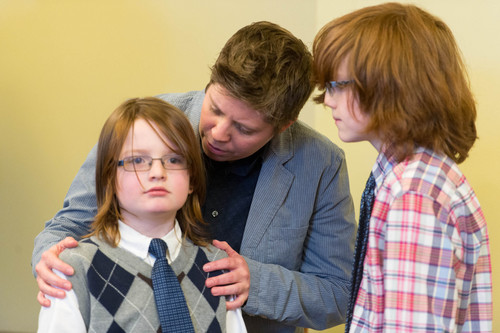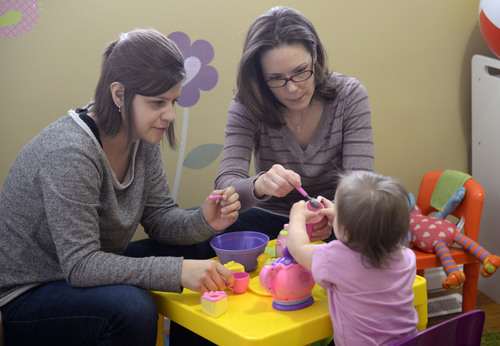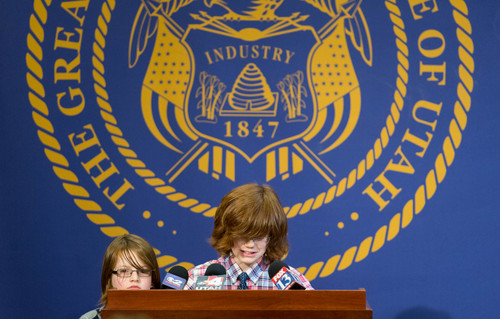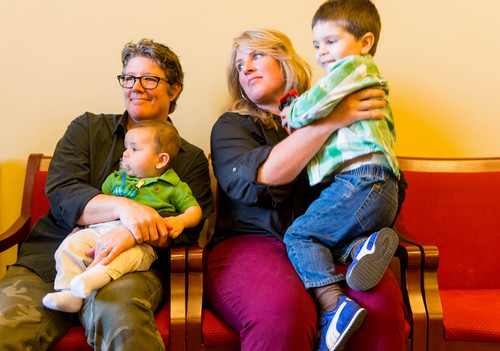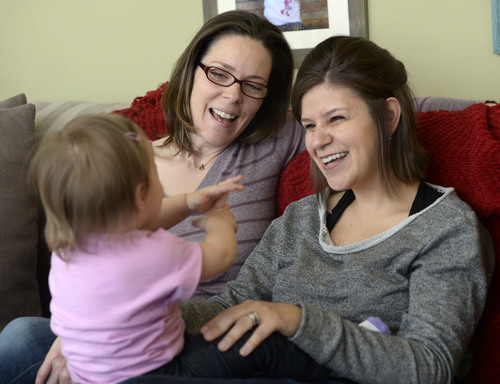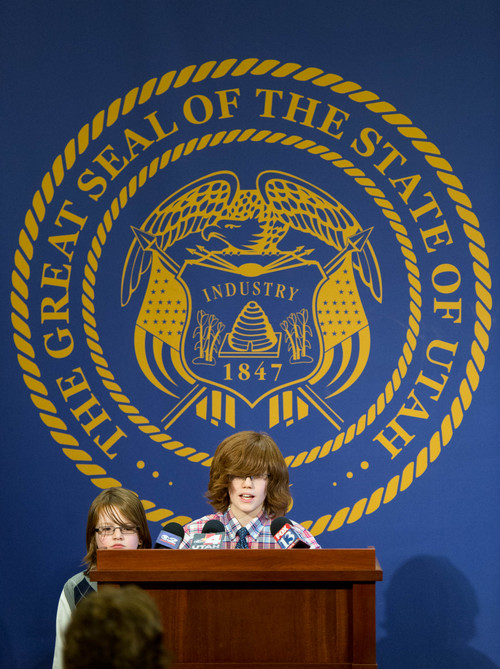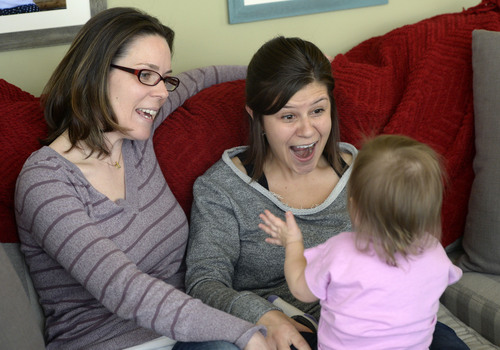This is an archived article that was published on sltrib.com in 2014, and information in the article may be outdated. It is provided only for personal research purposes and may not be reprinted.
When Amber and Kimberly Leary first met, the attraction was instant.
But Amber wanted to make one thing clear before they began dating: she wanted to be a mom someday and was looking for a partner who also wanted a family — which, as it turned out, was a priority for Kimberly, too.
That was more than six years ago. Today, the women are mothers to a 15-month-old girl, but only Amber, the biological mother, is their child's legal parent. They moved quickly to resolve that conundrum by marrying within hours of it becoming legal in Utah on Dec. 20. Days later they filed an adoption petition to add Kimberly as a second parent.
"We're thinking we're clear sailing here," Kimberly recalled.
"Merry Christmas to us," adds Amber.
"That's exactly what we were thinking," Kimberly said. "This is the best year ever."
But on Jan. 10 the 3rd District Court judge handling their petition required that the Utah attorney general's office be notified of the case and given 45 days to respond. On Monday, the Utah attorney general's office filed an opinion that says, since the decision overturning Amendment 3 has been stayed, the court cannot proceed with the Leary's petition until the constitutionality of the same-sex marriage ban is resolved.
The news devastated the Learys.
"We were supposed to be adopting," said Amber Leary, 31. "It was supposed to be A plus B equals C and then we were just done with it. ... This is about the well-being of our daughter, that's the bottom line, and to make sure that Kimberly has every right, just as I have every right to her, and she feels safe. It's frustrating."
They are not the only couple objecting to the state's intervention in their second-parent adoptions. On Friday, several couples and attorneys shared their stories during a press conference at the Capitol and called on the state to withdraw their opposition to the adoptions.
"Our clients are dismayed and hurt by the state's position," said attorney Laura Milliken Gray. She said that despite the state's claim that its primary concern is protecting children, it has interjected itself in a highly private and personal matter to the detriment of same-sex families.
"These children deserve justice and protections now," Gray said, urging the state to "allow these kids to have the rights and protections that come only when their parents can both adopt them."
Cindy Sanders, a senior development manager at Adobe, said her wife was home taking care of their napping son "while I fight for him."
Sanders said she and her wife, who married after Shelby's ruling, heavily researched "what it would mean to bring a child into a family like ours that is not the traditional Utah family in a state that cares about families" and found there wasn't any "justifiable evidence" to show their son would be harmed by growing up with two moms. They've taken extra steps to ensure he has godparents and relatives ready to fill in any parenting gaps.
"The most important thing to me is my son," said Sanders, adding that she wants to be able to provide for him as a parent in every way. "Love me or hate me, do what you will based off my decisions. But the reality is my son is here. ... Please do not hurt my son."
Leslie Neebling said it's offensive that she and her wife Charlotte Kornick have to go through what are termed "stepparent" adoptions.
"We're their parents," Neebling said of their children. "We went from the point of dreaming about what [our] family might look like to every step of the way trying to bring our family together in a legal sense."
"To grant us the simple right to be able to take care of our families seems very basic to me," she said.
Attorney Shane A. Marx, who represents the Learys, said he has four other adoption cases pending and has heard of as many as two dozen more being handled by attorneys he knows. The issue also is being raised by one couple in a federal lawsuit filed by the ACLU and the law firm Strindberg & Scholnick.
State judges have had varying responses to the adoption petitions. Some have not set hearings, letting the petitions languish; some issued stays on their own. Uncertainty led other judges to ask for an opinion from the Utah attorney general's office. A few adoptions apparently were completed before the U.S. Supreme Court issued a stay on Jan. 6.
The Utah attorney general's office provided a generic copy of the opinion it is filing in the cases to The Salt Lake Tribune. The opinion cites the state law that bars adults who live together from adopting a child and asks that the adoption be put on hold until an appeal of Shelby's decision is resolved — which could take up to two years, if the case proceeds as expected to the U.S. Supreme Court. The couples also have the right to ask that their adoption cases be dismissed and then refile them, the state said.
But for now, the couples' marriages must be considered invalid from their inception, it says.
"Our office has been consistent in our message from the beginning," said Missy Larsen, spokeswoman for the Utah attorney general's office. "The state cannot, under the current law of Amendment 3, recognize those marriages or anything that tethers to those marriages after the U.S. Supreme Court's stay on January 6."
But Marx asserts that as their child's legal parent, Amber has a constitutional right to parent as she sees fit and the state can't override her choice of a parenting partner. Their daughter has a fundamental right to associate with both parents. And they filed the adoption petition as validly married spouses with vested rights.
"For all those reasons the state can't interfere and must recognize the parent/child relationship of both women," Marx said.
Kimberly Leary, who works in the tourism industry, is her family's primary breadwinner, while Amber works part time as a registered nurse so she can care for their daughter. They put everything — emotionally, financially — into building their family, Kimberly said.
When there were complications with Amber's pregnancy, Kimberly struggled with the fact she did not have an automatic right to make decisions for her partner or a legitimate claim to their daughter.
"There was not that safety for me to know that if something happened to Amber that I would be taking my daughter home," Kimberly said, adding she realized that in Utah, her partner's family and the state had more rights to their child than she did.
"That wasn't the best feeling," Kimberly said.
Their daughter's birth in November 2012 was a wonderful experience, but also one tinged with sadness as Kimberly filled out the birth certificate and the couple found themselves answering questions about who was the "real" mother.
"I didn't want to take away from the celebration of the life of our baby that we had tried for three years to bring into the world and so I just pushed those feelings down and I just filled out all Amber's information and hoped that things would change one day and I would get to be recognized," Kimberly said.
There was, she added, a "whole lot of stress" because the laws aren't set up to support a family like theirs.
Prior to Shelby's ruling, they were contemplating moving to Washington, where they are also legally married and where second-parent adoptions are allowed, before adding another child to their family.
And then came Shelby's decision. Kimberly heard about it first and called Amber, who was at the grocery store with a crying baby who needed a nap, and told her instead to meet at the Salt Lake County Clerk's Office as fast as she could.
"She said it's now or never," Amber remembers.
Salt Lake City Mayor Ralph Becker married them that afternoon.
"I thought there was a revolution going on, the world has changed, and now my state suddenly loved me," said Kimberly, 39. "I had such an awesome feeling about what was going on."
With marriage came a sense of legitimacy and a sense that their child now had all the security, rights and protections that every other child in Utah has, she said.
"I actually didn't really think that much about what it meant for Amber and I, but what a gift that was for our child," Kimberly said.
The state's response was unexpected, though Kimberly said she knows it should not have been. Once again, they face fear and uncertainty about the legal standing of their family.
"The fact that I even have to adopt my child that we created together — we found a donor, we went through insemination, we went through pregnancy, we went through birth, and I've been raising my child — the fact that I even have to adopt her is baffling to me. I should just be recognized at birth as her parent."
That said, she holds fast to one thing: "We know this is going to happen."
Says Amber: "All we're here to do is do the right thing for our daughter."
And Kimberly finishes her thought: "That she can always plan on two parents being in her life no matter what."
Twitter: @Brooke4Trib


